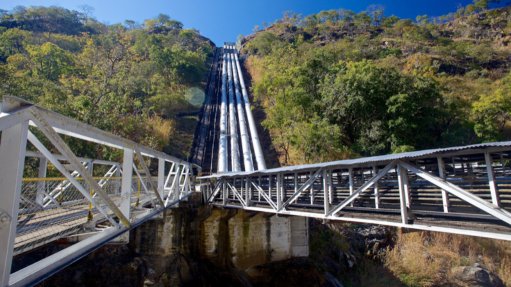On-The-Air (18/01/2019)
Every Friday, SAfm’s radio anchor Sakina Kamwendo speaks to Martin Creamer, publishing editor of Engineering News and Mining Weekly. Reported here is this Friday’s At the Coalface transcript:
Kamwendo: The mines are contributing vast tracts of land to turn western Gauteng into a farming paradise.
Creamer: The Far West Rand was a farming paradise, then the mines came along and they drained the water not realising that there are dolomitic cavities there. There were terrible repercussions of houses actually falling into sinkholes killing families. Now the mines are contributing in a far more positive way.
They are giving back 30 000 hectares of land, that is 50 km from the south to the north and 30 km from east to west. This is all part of the transformation of the farming sector in South Africa to bring more black farmers in. You see it is a public private partnership that will be officially launched in the next three months of this year. That will be something that takes farming in a new direction, because our farming has been maize orientated, which does not employ a lot of people, highly mechanised.
They are moving it towards pecan nuts, tomatoes, carrots, berries and fruits that are highly labour intensive. In fact, they literally employ 100 times more labour then you do for maize. So, it is good news out there that mines, land and water and also infrastructure will be used for an agrihub that is close to market, because they can come down the N12 and get to OR Tambo Airport quite quickly and be in global markets overnight. Big ambitions for this western Gauteng area to become a farming paradise.
Kamwendo: Calls are being made for the creation of a development coalition to place South Africa’s platinum mining business on a prosperous new path.
Creamer: The agriculture initiative that we see in the West Rand was all part of a coalition of public and private partnerships. They need the same sort of coalition now in platinum mining, which is just going downhill. You just see that price dropping, the demand has not been looked after as it should have and this coalition is needed now to put platinum mining on a proper business path, to manage the cycles better.
They have not been managed because there isn’t that demand. Now, you should have an underpinning of strategic funders for the coalition, because you need that funding to make the platinum, even if demand is low, and keep it until demand lifts it and you can put it back into the market.
This is what is now envisaged in again a public-private partnership to try and make sure that we protect our national patrimony, platinum group metal, which is so valuable to take us into the new hydrogen age where we see people are talking steps every day to get into this hydrogen age.
Just in this year alone there has been twelve major steps throughout the world and that means that they used platinum. The demand has been neglected and in the old days marketing was the big thing. They haven’t been doing that, but hopefully South Africa can reverse that and protect its national patrimony, platinum mining.
Kamwendo: The attempt to break the world land speed record on South African soil is back on track.
Creamer: Yes, it actually collapsed because the promoters of this, the Bloodhound Programme, ran out of funds last year and they had to go under administration. Now they have been bought out of their financial difficulties by a new UK entrepreneur, who is keen to get this going again. Of course, the target is also in miles an hour, which we are not used to in South Africa.
They want to get the 1 000 miles an hour, which is 1 609 km an hour. They are way off that mark in 1997 they were only at about 763 miles an hour. What the big news is for South Africa is that they have chosen South Africa to break this record and they have already been preparing the Hakskeenpan area, which is a salt pan in the Kalahari Desert.
This has been put at the ready to now renew this idea that we are going to break the land speed record on South African soil using a vehicle that is shaped like a pencil, but powered by a rocket. It is equivalent to about 135 000 horses, six times the power that we will have of the F1 cars on the grid even if they all push out together. So, a massive attempt to break the world land speed record in South Africa.
Kamwendo: Thanks very much. Martin Creamer is publishing editor of Engineering News and Mining Weekly.
Article Enquiry
Email Article
Save Article
Feedback
To advertise email advertising@creamermedia.co.za or click here
Press Office
Announcements
What's On
Subscribe to improve your user experience...
Option 1 (equivalent of R125 a month):
Receive a weekly copy of Creamer Media's Engineering News & Mining Weekly magazine
(print copy for those in South Africa and e-magazine for those outside of South Africa)
Receive daily email newsletters
Access to full search results
Access archive of magazine back copies
Access to Projects in Progress
Access to ONE Research Report of your choice in PDF format
Option 2 (equivalent of R375 a month):
All benefits from Option 1
PLUS
Access to Creamer Media's Research Channel Africa for ALL Research Reports, in PDF format, on various industrial and mining sectors
including Electricity; Water; Energy Transition; Hydrogen; Roads, Rail and Ports; Coal; Gold; Platinum; Battery Metals; etc.
Already a subscriber?
Forgotten your password?
Receive weekly copy of Creamer Media's Engineering News & Mining Weekly magazine (print copy for those in South Africa and e-magazine for those outside of South Africa)
➕
Recieve daily email newsletters
➕
Access to full search results
➕
Access archive of magazine back copies
➕
Access to Projects in Progress
➕
Access to ONE Research Report of your choice in PDF format
RESEARCH CHANNEL AFRICA
R4500 (equivalent of R375 a month)
SUBSCRIBEAll benefits from Option 1
➕
Access to Creamer Media's Research Channel Africa for ALL Research Reports on various industrial and mining sectors, in PDF format, including on:
Electricity
➕
Water
➕
Energy Transition
➕
Hydrogen
➕
Roads, Rail and Ports
➕
Coal
➕
Gold
➕
Platinum
➕
Battery Metals
➕
etc.
Receive all benefits from Option 1 or Option 2 delivered to numerous people at your company
➕
Multiple User names and Passwords for simultaneous log-ins
➕
Intranet integration access to all in your organisation



















